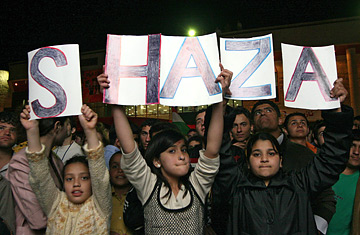
Iraqi girls hold the name of Shaza Hassoon, the winner of the pan-Arab Star Academy reality show contest, in the northern Kurdish city of Arbil, March 30, 2007.
The relative calm in the capital city set in relief a week when explosions killed more than 500 Iraqis across the country and threatened to reverse tenuous gains by U.S. and Iraqi forces in stemming sectarian violence. Since the security crackdown began seven weeks ago in Baghdad, executions in the capital have gone down from some 40 a day to less than 10, according to Iraqi police. But truck bombs in a Shi'ite section of the northern city of Tal Afar earlier in the week sparked a gruesome round of reprisals that saw local police officers executing some 70 Sunnis men in the town. Gen. David Petraeus, the commander of U.S. forces in Iraq, said in a statement Friday that the recent spike in bombings is part of an al-Qaeda in Iraq strategy to reignite sectarian violence and "undermine recent Iraqi and Coalition successes in improving security in Baghdad."
The most troubling sign of gathering clouds was a statement from firebrand Shi'a leader Moqtada al-Sadr that was read at Kufa mosque south of Baghdad. Al-Sadr, still believed to be in Iran waiting out the troop surge, renewed his demand that the "occupier leave our land." He criticized "evil" President Bush for invading Iraq in the name of keeping America safe without thinking of the cost in Iraqi blood. Four years after the U.S. came to Iraq, he said, the country's leaders are "fighting over offices" while Iraq is "still without water, has no electricity, no fuel and no safety." He called on his followers to march in a demonstration calling for the end of the occupation on April 9, the four-year anniversary of the fall of Baghdad.
On Friday night, gunfire exploded across Baghdad. But it was good news. Shaza Hassoon, daughter of an Iraqi father and Moroccan mother, won Star Academy, an American Idol-like singing competition in Beirut. Families had been gathered in front of television sets across Iraq every Friday night for four months cheering on one of their own. Hassoon won the competition with 7 million votes coming in via telephone and text messages from across the Middle East. The cheering crossed sectarian lines. In the northern — and Kurdish — city of Irbil and neighborhoods packed with Iraqi exiles in Amman, families took to the streets, cheering and waving flags.
